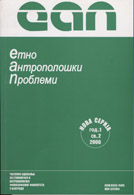Šta je (bila) antropološka "refleksivnost"? Metodološka formalizacija
What Anthropological Reflexivity Is/Was All About? A Methodological Formalization
Author(s): Miloš MilenkovićSubject(s): Anthropology, Fine Arts / Performing Arts, Methodology and research technology
Published by: Филозофски факултет, Универзитет у Београду
Keywords: history of anthropology; postmodern anthropology; ethnography; reflexivity; methodology; experiment; art; science;
Summary/Abstract: In this study, I suggest that reflexivity in anthropology can be viewed as a coordinative definition that helped anthropology survive its three crises – the crisis of ethnographic representation, the crisis of scientific realism, and the crisis of anthropological authority. In addition, reflexivity, in a specific sense, can be taken as a substitute for experiment, a subsititute even better than comparative studies, and can thus help fulfill the long dream of consolidating anthropology on firm scientific grounds (a dream I believe is, though, no longer necessary). This text should be understood as a part of a series of studies that strive towards the methodological formalization of supposedly formalization-resistant concepts of postmodern anthropology. In reality, reflexive anthropology became postmodern science only by admitting to be experimental art, but the question is who would understand and, more importantly, finance and apply this concept? The incorporation of reflexivity into the core of anthropology enabled it to finally achieve the status of science, in the most conservative and general methodological sense. Therefore, the anti-postmodern frustration present in some relatively recent debates, examples of which we can see in this volume, is neither methodologically nor pragmatically founded. Reflexivity can only be useful, not harmful to the discipline, even from the standpoint of traditional, problem-applicative concepts of method. The only remaining assignment is to reformulate it so it could be applied by methodological traditionalists as well.
Journal: Етноантрополошки проблеми
- Issue Year: 1/2006
- Issue No: 2
- Page Range: 157-184
- Page Count: 28
- Language: Serbian

